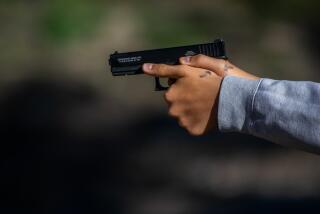Texas college students at center of gun legislation debate
- Share via
Reporting from Austin, Texas — Konrad Sliwowski stood in the shadow of the University of Texas clock tower surrounded by the lunchtime clamor: the student election volunteers in handmade “Vote Big John” T-shirts, the Lego Club, and activists against human trafficking stationed near fliers advertising a screening of “Airplane!”
“I don’t like guns in any kind of situation,” the 22-year-old senior said recently while passing out fliers for a lecture on Rwanda. “School is already an emotional battleground. To add on a physicality to it, you could really stir things up.”
Sliwowski and his classmates — not yet born when a student gunman opened fire atop the clock tower in the summer of 1966 — are now at the center of a debate over whether to allow concealed handguns on Texas college campuses.
A proposed law would make Texas one of the few places in the nation where faculty, staff and students with concealed handgun licenses could bring guns inside campus buildings.
Supporters say it would give them the same rights of self-defense they have off campus and could help prevent massacres like the one at Virginia Tech that claimed 32 lives in 2007. The bill has substantial political support at the state Capitol, but remains weeks away from a vote.
About 500,000 people have concealed handgun licenses in Texas, a state where handguns are allowed inside the Capitol and hunters outnumber the population of South Dakota. State law requires that concealed handgun carriers be at least 21, complete a training course and pass a background check.
At the University of Texas, which has more than 50,000 students, the debate resonates with both distant and recent history. The 1966 shootings killed 14 people and seared the threat of school violence into American consciousness.
Then last September, a 19-year-old gunman wielding an AK-47 assault rifle terrorized the campus before killing himself on the sixth floor of the library.
Randall Wilhite, an adjunct professor at the university law school, was driving toward campus that day when he heard five shots. He watched students scatter behind trees and saw the gunman in a ski mask fire shots into the median.
Wilhite recently applied for a concealed handgun license, motivated by the incident and a recent robbery of his home. He often wonders what he would have done that September morning if he had been carrying a weapon.
The professor — who believes the proposed law could make campuses safer — has not decided when and where he will carry a gun when he receives his license.
“What I’m going to do with it remains to be seen,” he said. “I would not take it to class under existing law. If the law changes, I would seriously consider it.”
Others here cringe at the prospect of guns in an environment saturated with roommate rivalries, melodramatic romances, alcohol, depression, parties, academic pressure and the emotional exigencies of finding oneself at college.
“It’s possible to envision scenarios in which a student carrying a gun could help save lives. It’s a lot easier to envision multiple scenarios in which it would not be good for a student to have a gun,” said Phillip Barrish, an associate professor in the English Department.
In September, Barrish found himself a few feet from the gunman inside the library. He said the prospect of another student or faculty member pulling a gun in self-defense could have made the situation even worse, potentially turning the gunman’s thoughts from suicide to murder.
More philosophically, Barrish fears that guns could change the educational environment, eroding the trust needed for a vigorous exchange of ideas. He also worries about students being armed during disciplinary hearings or professors’ office hours.
“I think I would always have it in the back of my mind,” he said.
Jeff Wentworth, the Republican state senator who has spearheaded the gun legislation, says he hopes to prevent a repeat of what happened at Virginia Tech. He says he believes that if students and staff there had been carrying firearms, “lives would have been saved that day.” An earlier version of the bill stalled last session.
University of Texas President William Powers says he sees the merits of both arguments, but believes potential benefits are outweighed by the risks.
“I think the faculty is, both in the last session and currently, not in favor of more guns on campus,” he said. “Police are not in favor of more guns on campus. I think an overwhelming number of students are not in favor of it.”
One of those in favor of the bill is Kory Zipperer, the 21-year-old vice president of the university’s chapter of Students for Concealed Carry on Campus. Zipperer, a psychology major with ambitions of becoming a Houston police officer, recently received his concealed handgun license. He says resistance to such legislation on campus has softened, particularly after the September violence.
“In 2008, the reaction was just that we were lunatics, that we were completely crazy,” he said.
Zipperer and other supporters cite statistics that they say show there’s no reason to believe that violence will increase by letting guns on campus.
John Woods doesn’t buy the statistical argument. Woods was an undergraduate at Virginia Tech during the 2007 shootings, and lost a close friend in the rampage. He’s now a leader of Students for Gun-Free Schools in Texas.
“Kory’s not the type of person I’m worried about,” he said.
What worries him is the potential for more suicides and crimes of passion. He also fears the longer-term implications.
“What happens when it becomes the culture of the classroom?” he asked.
Meyer writes for The Times.
More to Read
Sign up for Essential California
The most important California stories and recommendations in your inbox every morning.
You may occasionally receive promotional content from the Los Angeles Times.










